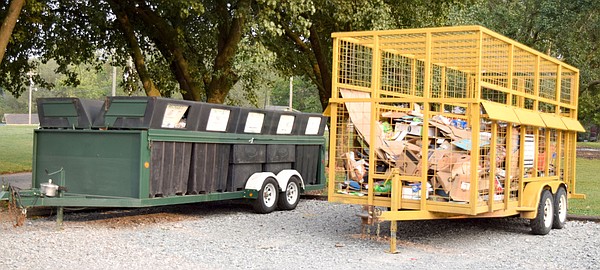Going round in circles is often classified as a bad thing.
Congress, to offer one example.
Circular reasoning can be found in abundance because a lot of people are using it (see what we did there?)
Roundabouts, though, are growing in, well, maybe not popularity, but people seem to be getting a little more used to them. When street planners first started building roundabouts into Northwest Arkansas’ transportation network, though, some drivers disliked them with a passion. The truth is, if you’re really going in circles on a roundabout, you’re not doing it right.
Going in circles can otherwise be a good thing. At least that’s the message coming from the private Northwest Arkansas Council, a nonprofit business organization that has promoted select projects in this region for decades. In fact, the organization suggests the region could use a little more circularity.
Its recent message is about recycling, which many people accept as a responsible individual activity in which to participate. But the council, through a recent commissioned study, advocates an intensified effort for “circular movement of recycled and recovered materials.” In other words, the region can reap benefits by replacing use-it-then-toss-it mentalities within waste systems with a more robust “circular economy.”
Such mentalities can be involve recycling materials from and for building construction, transportation systems and retail markets.
According to the study, such an economy is driven by a more expansive regional vision to reduce or eliminate waste and pollution and keep products and materials in use, rather than in landfills.
The study, commissioned through The Sustainability Consortium with funding by the Walmart Foundation, recognizes the challenges inherent in attempting to coordinate recycling efforts. The region, after all, includes 35 cities, two solid waste districts, and hundreds of private haulers and companies.
The kinds of decision-making necessary to advance regional opportunities for collection, hauling, processing and marketing of recyclable materials isn’t likely to happen by accident. It’s going to take a concerted effort to bridge many varied interests. On such matters, whether it’s a regional jail or other cooperative ventures, the existence and perpetuation of fiefdoms have been known to prevent any real progress.
But the Northwest Arkansas Council has some experience finding common ground. The organization led the charge on regional projects such as the Northwest Arkansas National Airport and the Benton-Washington Public Water Authority delivering water to rural areas and communities.
The idea is bigger than just a truck pulling up in front of a residence to collect cans and cardboard, although that’s certainly part of it. The study imagines a sweeping conversion, over time, to processes that turn used packaging and products into building materials or new consumer goods within Northwest Arkansas and not relying on external markets.
Because regional, national and international markets for recyclable goods often dictate how successful local recycling approaches can be, the study advances a goal of ensuring Northwest Arkansas “products and packaging are created, used, recycled and reused in the same area.” It is, essentially, a re-circulation of materials, keeping as much as possible from ending up in a landfill.
The admirable idea is to build, through cooperation, hardier systems of recycling that will become their own form of economic development because it creates new business opportunities in collection, material processing or manufacturing.
It’s no doubt easy to read such a report and consider it a bit of a pipe dream, given the many government entities, private businesses and residents who would need to buy into such plans. Today, recycling efforts are much more siloed than this vision anticipates. The two solid waste districts involved have actually been engaged in litigation with each other lately.
The good news, the study says, is that when the various interests involved in today’s recycling efforts were brought together, there was excitement at the possibilities. Just by conducting the study, people and organizations identified as “stakeholders” reported the council had created “much-needed community building activities for the materials management community.”
It’s exciting to hear of these possibilities. Our growing region has some recycling success stories, but also inefficiencies and lost opportunities. It would be no small feat to bring all the interests together, but maybe the Northwest Arkansas Council is just the organization to make it happen.
What’s the point?
If anyone can find common ground for recycling interests in this region, it might be the Northwest Arkansas Council.


